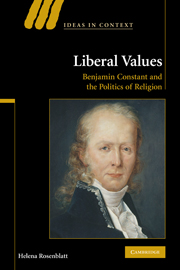Book contents
- Frontmatter
- Contents
- Acknowledgements
- Note on translations
- List of abbreviations
- Introduction
- Chapter 1 Constant's education: the French, Scottish, and German Enlightenments
- Chapter 2 The crucible of the Directory years
- Chapter 3 Napoleon, or battling “the new Cyrus”
- Chapter 4 Constant becomes Constant: from the Principles of Politics (1806) to The Spirit of Conquest and Usurpation (1814)
- Chapter 5 Politics and religion during the Restoration (1814–1824)
- Chapter 6 “The Protestant Bossuet”: De la religion in political context (1824–1830)
- Chapter 7 Constant's legacy
- Select bibliography
- Index
- Ideas in Context
Chapter 4 - Constant becomes Constant: from the Principles of Politics (1806) to The Spirit of Conquest and Usurpation (1814)
Published online by Cambridge University Press: 22 September 2009
- Frontmatter
- Contents
- Acknowledgements
- Note on translations
- List of abbreviations
- Introduction
- Chapter 1 Constant's education: the French, Scottish, and German Enlightenments
- Chapter 2 The crucible of the Directory years
- Chapter 3 Napoleon, or battling “the new Cyrus”
- Chapter 4 Constant becomes Constant: from the Principles of Politics (1806) to The Spirit of Conquest and Usurpation (1814)
- Chapter 5 Politics and religion during the Restoration (1814–1824)
- Chapter 6 “The Protestant Bossuet”: De la religion in political context (1824–1830)
- Chapter 7 Constant's legacy
- Select bibliography
- Index
- Ideas in Context
Summary
CONSTANT'S POLITICAL PRINCIPLES IN 1806
In 1806, Constant distilled all that he had learned from his travels, conversations, extensive reading, and experiences in government, and poured it into his Principles of Politics Applicable to All Governments. A work now regarded as one of the masterpieces of European political philosophy, it is Constant's most definitive political text. Although Constant chose not to publish it, no doubt due to a change in the political climate, it became a storehouse of ideas and phrases upon which he would draw extensively for later writings, such as the Spirit of Conquest and Usurpation (published in 1814) and a revised, shortened version of the Principles of Politics (published in 1815).
The Principles of Politics constitutes the first and most complete example of Constant's transformation into a truly liberal political thinker. In it, he articulated for the first time what are now considered the key tenets of his mature philosophy, essential principles from which he would not deviate for the rest of his life. Certainly, however, his basic political convictions had not changed since 1795. Once again, Constant denounced arbitrary government and defended the main accomplishments of the early phase of the Revolution: civil equality, representative government, and legal safeguards protecting the rights of the individual. Now, however, he took the crucial step of declining to defend any specific type of regime or constitution.
- Type
- Chapter
- Information
- Liberal ValuesBenjamin Constant and the Politics of Religion, pp. 122 - 154Publisher: Cambridge University PressPrint publication year: 2008

